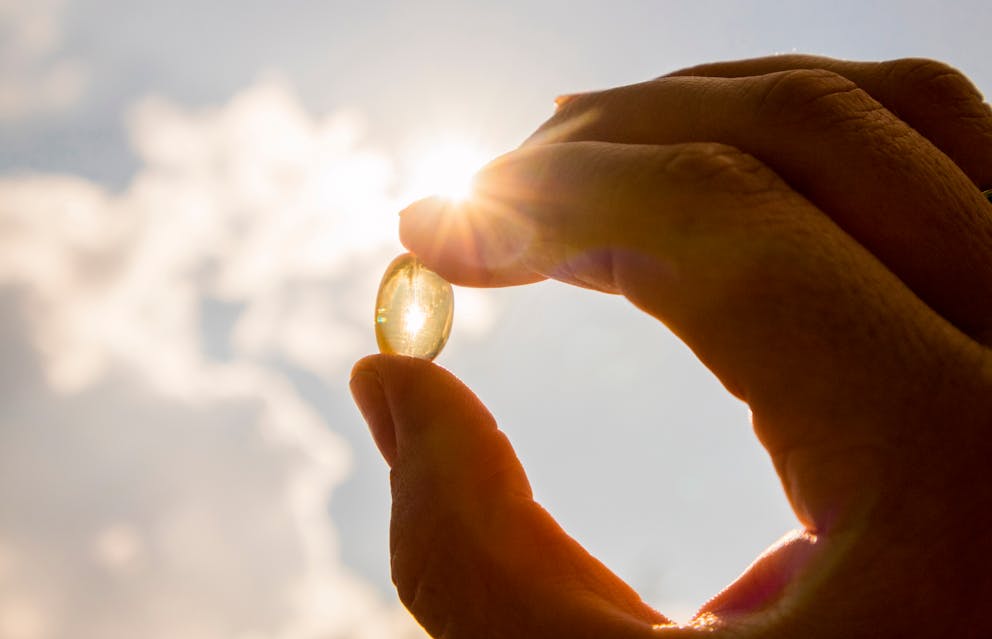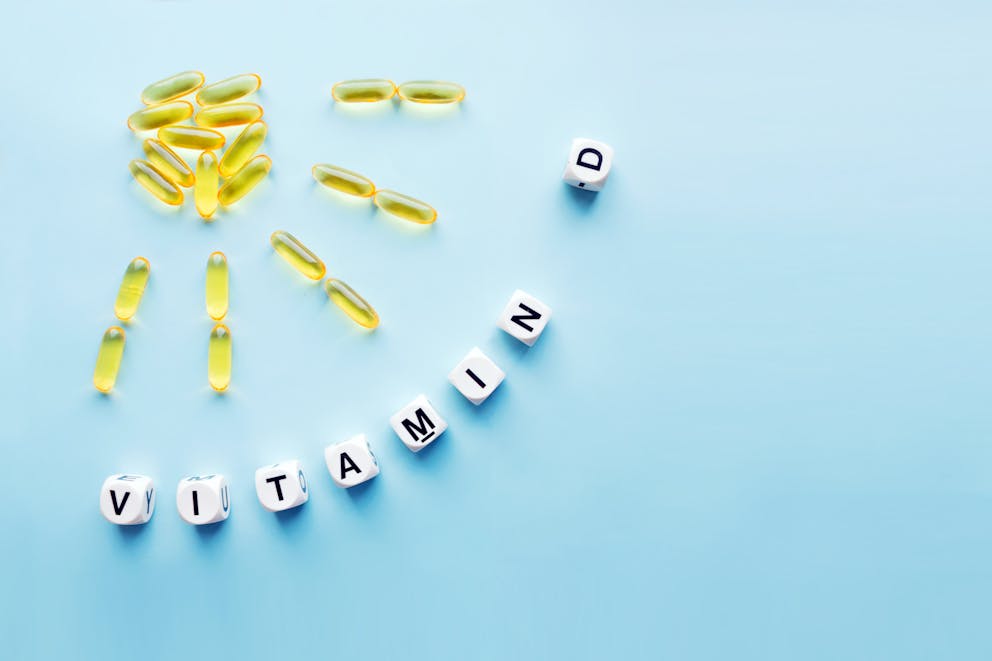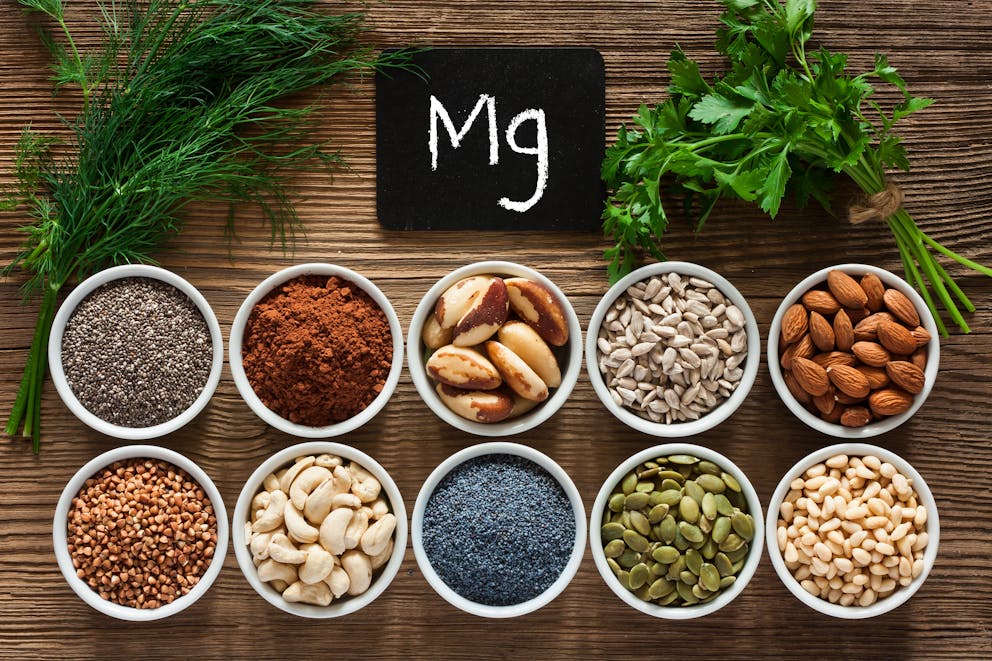What Helps Vitamin D Absorption? Everything You Need to Know
Vitamin D is a fat-soluble vitamin crucial for bone health and immune function. Unfortunately, various factors can impair the body’s ability to absorb vitamin D, which explains why vitamin D deficiency is so widespread.
Discover what helps vitamin D absorption and how to maximize the health benefits of vitamin D.

Vitamin D absorption explained
Vitamin D is a fat-soluble vitamin that’s naturally produced in response to sun exposure.
Ultraviolet B (UVB) radiation in sunlight can penetrate the skin and trigger a chain of biochemical reactions that convert 7-dehydrocholesterol to cholecalciferol, also known as vitamin D3.
Vitamin D3 is then transported to the liver and kidneys, where it undergoes enzymatic conversion into its active form.
Vitamin D3 can also be found in small amounts in certain foods, such as fatty fish, cod liver oil, beef liver, and egg yolks.
Dietary and supplemental vitamin D3 is absorbed in the small intestines with the aid of bile salts and the pancreatic enzyme lipase, needed for the breakdown and digestion of dietary fats and fat-soluble vitamins, including vitamin D3.
Vitamin D is stored in the liver and fat cells, which serve as a reservoir to maintain adequate vitamin D blood concentrations. However, prolonged lack of sunlight exposure can deplete body stores and lead to vitamin D deficiency.
Watch the video below to learn how to boost vitamin D absorption.
Risk factors for low vitamin D absorption
While lack of adequate UVB exposure is the primary cause of low vitamin D absorption, many other factors can impact the body’s vitamin D status.
The skin's ability to synthesize vitamin D from sunlight decreases with age, which is a significant risk factor for low vitamin D absorption in older adults.
“The body requires adequate amounts of cholesterol to produce Vitamin D,” explains Dr. Berg. “A low-fat diet or cholesterol-lowering drugs such as statins can lower concentrations of 7-dehydrocholesterol and impair vitamin D absorption.”
Skin tone also plays a role in vitamin D absorption. Darker skin contains more melanin, a pigment that determines skin color. Melanin lowers the body’s ability to produce vitamin D, which explains why skin color can affect vitamin D levels.
In addition, a study published in Cancer found that African Americans, Hispanics, and Indians are at increased risk of genetic variability that impacts vitamin D metabolism associated with low vitamin D absorption despite adequate sunlight exposure.
Intestinal vitamin D absorption requires several cofactors, digestive enzymes, and bile salts, and certain mineral deficiencies, poor gallbladder function, or malabsorption issues can impair the body’s ability to absorb vitamin D efficiently.
A study published in BioMed Research International found that conditions like Crohn’s disease, celiac disease, liver disease, and inflammatory bowel disease (IBD) can significantly impede vitamin D absorption, leaving many at risk of vitamin D deficiency.

What helps vitamin D absorption?
It’s estimated that almost half of all U.S. adults have insufficient vitamin D levels or are deficient, leaving a large proportion of individuals at risk of poor bone health and impaired immune function.
Vitamin D supplements are amongst the most popular dietary supplements and a safe and effective way to promote healthy vitamin D levels.
Here are eight nutrients that can help your body absorb vitamin D.
1. Vitamin D3
Vitamin D2 is a form of vitamin D that’s cheap to produce and is often found in low-cost supplements and vitamin D-fortified foods.
Compared to vitamin D3, the same potent version produced in the body, vitamin D2 isn’t as readily absorbed and is less effective at maintaining healthy vitamin D status.
Research published by The Harvard School of Public Health recommends taking dietary supplements formulated with vitamin D3 to enhance intestinal absorption and prevent vitamin D deficiency.
2. Vitamin K2
Vitamin K2 plays a role in enhancing the health benefits of vitamin D.
Vitamin D3 and vitamin K2 work in synergy and are crucial for calcium balance, bone metabolism, and cardiovascular health.
Combining vitamin D3 with K2 is associated with improved bone health, better calcium balance regulation, and a lower risk of arterial calcification, a leading cause of atherosclerosis and heart disease.

3. Magnesium
Magnesium activates proteins that facilitate the intestinal absorption of vitamin D. In addition, enzymes in the liver and kidneys needed to convert vitamin D into its active form require adequate magnesium to function effectively.
A study published in the Journal of the American Osteopathic Association confirms, “It is essential that the recommended amount of magnesium is consumed to obtain the optimal benefits of vitamin D.”
Most healthcare providers suggest magnesium intakes of around 400 mg daily, either through supplementation or magnesium-rich foods such as pumpkin seeds, spinach, almonds, avocados, and dark chocolate.
4. Zinc
Zinc is an essential cofactor for various enzymes involved in vitamin D metabolism.
Lack of zinc impairs the enzymatic conversion of vitamin D3 into its active form, which increases the risk of vitamin D deficiency despite adequate sun exposure and dietary vitamin D intake.
5. MCT oil
Medium-chain triglycerides (MCTs) are easily digested fatty acids that help dissolve and transport fat-soluble vitamins such as vitamin D in the small intestines.
Taking vitamin D in combination with MCT oil can significantly increase intestinal vitamin D absorption and promote optimal vitamin D levels.

6. Cod liver oil
Cod liver oil contains highly bioavailable vitamin D3 and omega-3 fatty acids, which enhance the solubility and absorption of vitamin D.
In addition, cod liver oil contains vitamin A, another fat-soluble vitamin that works in synergy with vitamin D to support strong immune defenses.
7. Purified bile salts
Bile salts are stored in the gallbladder and are needed to emulsify dietary fats and fat-soluble vitamins, significantly enhancing vitamin D absorption.
Individuals with digestive issues, sluggish gallbladder function, and those who had their gallbladder removed often benefit from purified bile salts to support healthy fat digestion and vitamin D levels.
8. Probiotics
A diverse gut microbiota plays a vital role in maintaining bile salt concentrations necessary to absorb vitamin D effectively.
Beneficial intestinal bacteria recycle bile acids used during digestive processes back into the liver and gallbladder, which aids the digestion of dietary fat and vitamin D.
Evidence published in Applied Sciences suggests that probiotic supplements and probiotic foods
such as kefir, sauerkraut, kimchi, and kombucha, can enhance digestion and support microbial diversity.

Signs of poor vitamin D absorption
Symptoms of low vitamin D levels include fatigue, muscle weakness, bone pain, unexplained hair loss, sore gums, frequent infection, and mental health issues such as depression and seasonal affective disorder (SAD).
If you show signs of vitamin D deficiency despite plenty of sunlight exposure or regularly taking vitamin D3 supplements, it’s recommended to consult a healthcare provider.
An evaluation of your symptoms in combination with blood tests helps identify if you are affected by poor vitamin D absorption and can guide an appropriate treatment plan.
How to find a quality vitamin D supplement
A good quality vitamin D supplement contains vitamin D3 and vitamin K2 to support optimal calcium balance and vitamin D absorption.
It’s recommended to take a balanced vitamin D3 and K2 product with a ratio of 1000:10, meaning that it contains at least 10 mcg of vitamin K2 for each 1000 IU of vitamin D3.
Individuals with poor digestive health, gallbladder issues, or liver problems may benefit from a liquid form of vitamin D3 and K2 combined with MCT oil to enhance the body’s ability to absorb vitamin D.
The National Institute of Health (NIH) recommends 600 IU of vitamin D daily. However, 600 IU won’t be enough vitamin D for individuals with poor vitamin D absorption, and a significantly higher dosage of up to 10,000 IU of vitamin D3 daily may be necessary to maintain healthy levels.

Key takeaways
Vitamin D absorption can be impaired by several factors, such as nutrient deficiencies, poor gallbladder function, or a low-fat diet. So, what helps vitamin D absorption?
Combining vitamin D3 with vitamin K2, consuming plenty of magnesium and zinc-rich foods, promoting a diverse microflora, and supporting fat digestion enhances vitamin D absorption and can help prevent vitamin D deficiency.
Additional resources
FAQ
1. What blocks vitamin D absorption?
Vitamin D absorption can be blocked by several factors, including genetic predisposition, darker skin tone, age, gastrointestinal condition, and a lack of adequate cholesterol levels, often linked to a low-fat diet or cholesterol-lowering drugs.
2. What helps vitamin D absorption?
Vitamin D absorption can be enhanced by taking vitamin D3 in combination with vitamin K2 and medium-chain triglycerides (MCTs).
In addition, magnesium and zinc are needed to activate vitamin D, and adequate levels of bile salts are required for effective vitamin D absorption.
3. What is the best vitamin for vitamin D absorption?
Vitamin K2 works in synergy with vitamin D, and taking a supplement that contains vitamin D3 and K2 has been found to enhance the effectiveness of vitamin D.
4. Do I need magnesium to absorb vitamin D?
Magnesium plays a crucial role in activating proteins that aid in absorbing both supplemental and dietary vitamin D by transporting it across the intestinal lining.
5. Do I need vitamin K2 to absorb vitamin D?
While vitamin K2 isn’t directly involved in the absorption of vitamin D, it plays a vital role in vitamin D metabolism and has been found to improve the effectiveness of vitamin D for calcium balance, bone health, and cardiovascular function.
6. What is the best form of vitamin D for absorption?
Compared to vitamin D2, a synthetic form of vitamin D, vitamin D3 has a greater bioavailability, meaning it can be absorbed more easily and has been found to be more effective at correcting vitamin D deficiency and maintaining healthy vitamin D.
7. Can MCT oil improve vitamin D absorption?
Yes, MCT oil can improve vitamin D absorption.
MCT oil contains fatty acids that can readily enter the liver and help dissolve and transport fat-soluble vitamins, which significantly enhances vitamin D absorption.
8. Can zinc improve vitamin D levels?
Yes, zinc has been found to improve vitamin D absorption by stimulating enzymes that convert inactive vitamin D into its active form.
Zinc may be especially beneficial for individuals who show signs of vitamin D deficiency despite taking vitamin D supplements and adequate sunlight exposure.
9. Why is my body not absorbing vitamin D?
There are several reasons why your body may not absorb enough vitamin D. Lack of adequate sunshine, genetic predisposition, age, and darker skin tone can impact vitamin D absorption and increase the risk of deficiency.
In addition, magnesium and zinc deficiency, poor digestive health, and a low-fat diet can also contribute to impaired vitamin D absorption.
10. What are the signs of poor vitamin D absorption?
Poor vitamin D absorption can lead to symptoms of vitamin D deficiency despite plenty of sunshine exposure or regularly taking vitamin D supplements.
Common signs of low vitamin D levels include frequent infections, soft and brittle bones, fatigue, sore gums, poor wound healing, hair loss, acne, and muscle pain.
11. How long do you need to be in the sun to prevent vitamin D deficiency?
How long you need to be in the sun to produce adequate vitamin D levels depends on the season and geographical location and your skin type, age, and health status.
General guidelines suggest that between 10 and 30 minutes of midday sun exposure several times a week is adequate to maintain adequate vitamin D levels in most healthy adults.
Sources
Previous blog
What's the Difference between Vitamins K1 and K2?Tags

Popular
08/21/2024
55.7K views
02/23/2025
46.8K views
11/18/2024
281K views
03/18/2024
11/21/2022




